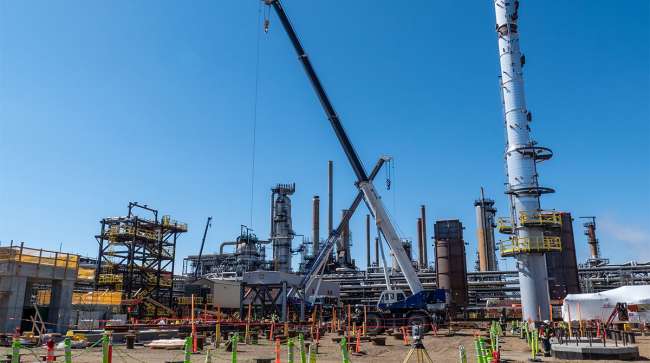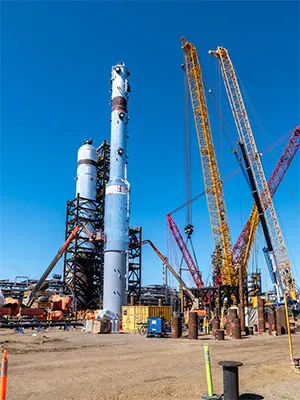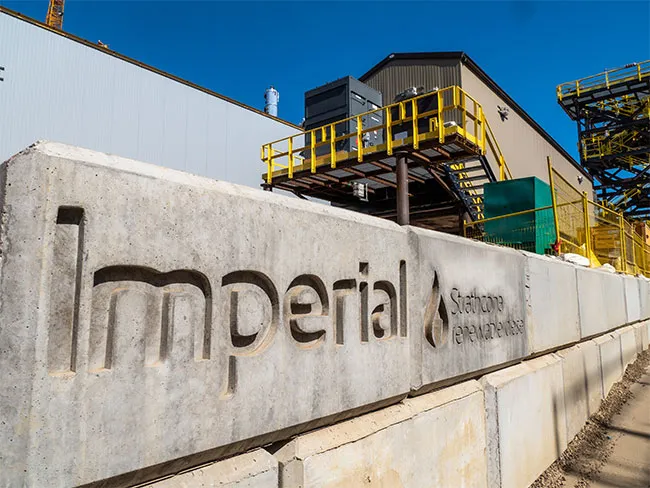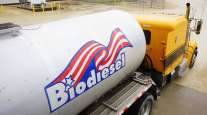Staff Reporter
Tax Credit Lures Canada’s Largest Renewable Diesel Venture

[Stay on top of transportation news: Get TTNews in your inbox.]
Canada’s Alberta province has provided an Agri-Processing Investment Tax Credit to Imperial Oil Ltd. for a C$720 million project to build the nation’s largest renewable diesel facility with capacity to produce 20,000 barrels daily next year.
“Imperial’s renewable diesel facility is the first of its kind in Alberta and will put the province on the map as a significant producer within Canada. The new facility at the Strathcona refinery is expected to produce more than 1 billion liters of renewable diesel per year,” Jessi Rampton, Alberta’s press secretary for agriculture and irrigation, told Transport Topics.
With Canada’s lowest corporate tax rate at 8%, Alberta has launched its Agri-Processing Investment Tax Credit to make the Western province a hot spot attracting large business investments for processing agricultural products. Alberta is just over 255,500 square miles and shares a border with Montana. It is one of Canada’s three prairie provinces.
Alberta’s government is providing a 12% nonrefundable tax credit to corporations investing at least C$10 million to build/expand an agriprocessing facility there. Up to C$175 million in tax credits is available for each project. Corporations have 10 years to claim the tax credit.
To be eligible, companies must be incorporated, registered or continued under Alberta’s Business Corporations Act and invest in projects there directly supporting an eligible value-added agricultural activity. Corporations that obtain other financial incentives from the province can apply for the tax credit.
So far, the Alberta government has two takers for the tax credit and more are expected. Conditional government approvals were announced in April for the Imperial Oil project for a C$70 million tax credit and in February for a C$1.3 million tax credit for The Little Potato Co.’s C$39.5 million venture to double its potato processing capacity to 125 million pounds, produce more packaged potatoes with seasonings for fast cooking and export 70% of its potatoes to the United States. Little Potato, based in Edmonton, works with family farms throughout Canada and in Wisconsin.
Sherri Evers, Imperial senior vice president of sustainability, commercial development and product solutions, stated that the new output will help to lower transportation emissions.
“We are excited that the main source of feedstock for the facility will be from crops in western Canada and thank the government of Alberta for their recognition of the project’s benefits to the agricultural industry and our collective greenhouse gas emissions-reduction goals,” Evers said.

Imperial received a C$720 million tax credit to build the facility. (Government of Alberta)
Imperial Oil, headquartered in Alberta, is one of Canada’s largest integrated oil companies active in all phases of the petroleum industry, according to its annual report for the fiscal year ending Dec. 31, 2023. Its renewable diesel facility will use low-carbon hydrogen, locally sourced and grown feedstocks and its proprietary catalyst to produce biofuel.
R.J. Sigurdson, Alberta’s minister of agriculture and irrigation, noted that the government offers “a business-friendly regulatory climate that attracts cutting-edge bioprocessing projects like Imperial’s renewable diesel facility.”
“Our Agri-Processing Investment Tax Credit program builds on other competitive tax advantages that encourage corporations like Imperial to invest in our province, create jobs and make an economic impact,” he said.
The province also promotes its high-quality agricultural raw materials at a competitive cost, easy access to world markets and innovative research and development capabilities.
“This incredible project demonstrates that our province is becoming a world leader in alternative fuels and energy innovation,” stated Brian Jean, provincial energy and minerals minister. “Renewable diesel has great potential and is a welcome addition to our energy mix, which includes hydrogen and renewables.”
Canada’s canola producers applaud the Imperial Oil project.

The new facility is at the Strathcona refinery. (Government of Alberta)
“We are excited to see this investment being made in Alberta’s canola country. Local production of renewable fuels derived from locally grown canola provides an important market diversification opportunity right here in our own backyard that will benefit farmers, processors and the entire value chain in the province of Alberta,” said Chris Vervaet, executive director of the Canadian Oilseed Processors Association.
According to the association, processing canola and soybeans generates C$6.5 billion in economic activity yearly in Canada.
Last year, Alberta produced almost 30% of Canada’s canola at 5.4 million tonnes. It is the nation’s second-largest producer after Saskatchewan’s 9.7 million tonnes.
“When production begins in 2025, Imperial’s new facility will convert locally sourced biofeedstocks like canola oil into lower-emission renewable diesel, creating new demand for Alberta producers,” Rampton said. “The project is creating about 600 local construction jobs for Albertans and hundreds more through investments by business partners.
“Once the facility is completed, hundreds of farmers and workers in Alberta’s biofeedstock industry will enable the company to produce a fuel that helps reduce greenhouse gas emissions in the Canadian transportation sector.”
Want more news? Listen to today's daily briefing below or go here for more info:




